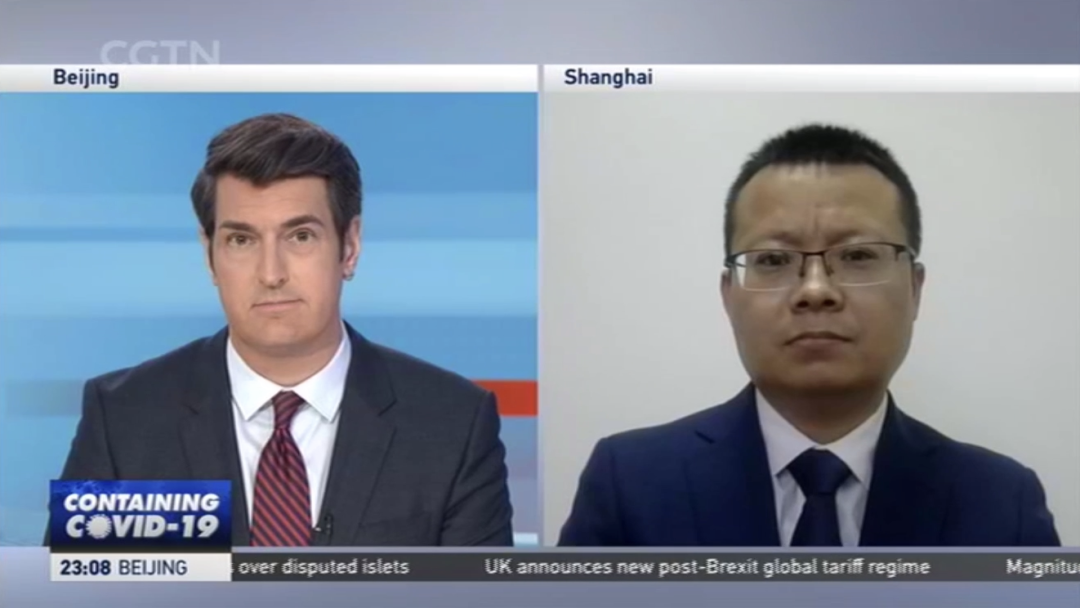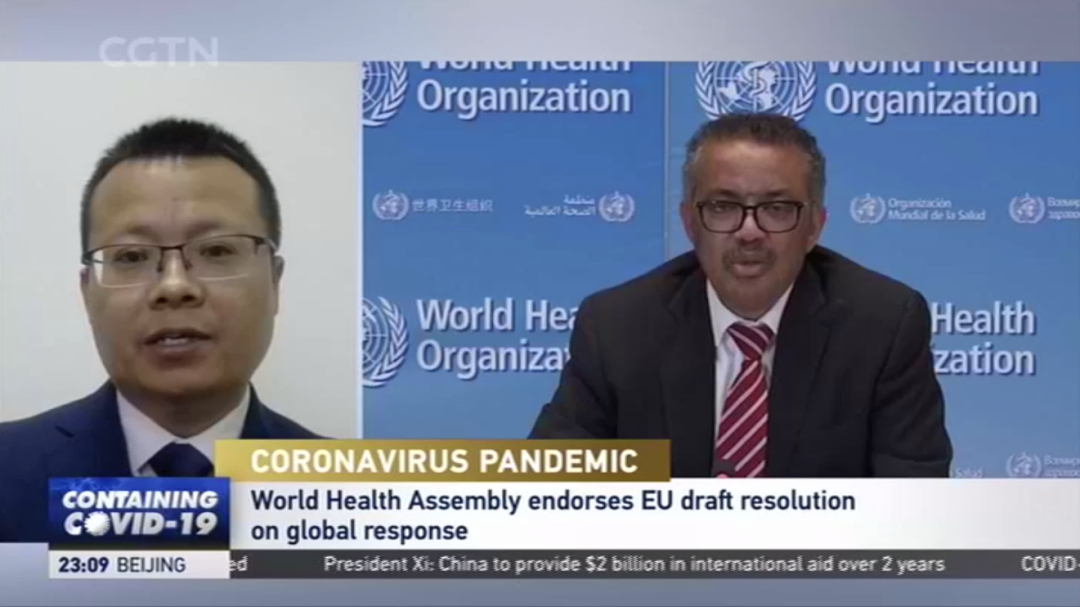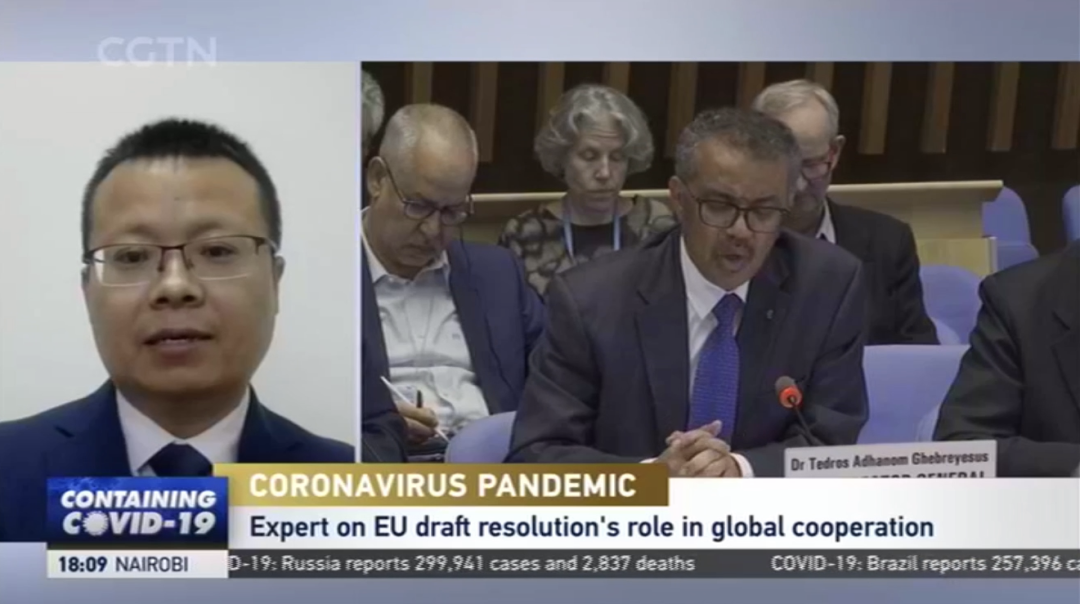上海交大赵大海关于新冠疫情第33次在电视台访谈评论:世卫组织大会应是各国携手抗击疫情的最好机会

上海交通大学国际与公共事务学院博士生导师、上海交通大学-耶鲁大学卫生政策联合研究中心执行主任赵大海,对于新冠肺炎疫情暴发与防控第19次在中央电视台进行直播评论,也是第33次在央视、上视进行访谈评论。在2020年5月19日的中央电视台英语频道《链接天下》节目,赵大海就第73届世界卫生组织大会欧盟发起的决议草案等议题进行了解读和评论。现将主要内容摘录并翻译如下。
主持人:我们联系到上海交通大学和耶鲁大学卫生政策联合中心的执行主任赵大海。很高兴您今天参与到我们的讨论。在第73届世界卫生组织大会上,世界卫生组织同意调查病毒的起源。很明显,中国将成为焦点。我想知道您对这一举动的反应。
赵大海:据我了解,决议草案是有意义的、积极的。这项决议草案是致力于加强全球协调,共同抗击新冠肺炎疫情。通过包括中国在内的130多个国家共同发起和支持决议草案来看,世界大多数国家似乎都站在了一起来共同抗击新冠肺炎疫情。这是全球抗击新冠肺炎疫情的良好开端。在某种程度上,大多数国家站在一起可能比决议草案本身更重要。对于全球应对的下一个步骤,如何改进全球大流行预防、预警和应对能力,包括通过加强世卫组织的卫生紧急情况规划,将是最重要的工作。总之,草案目的不仅是为了在全球范围内抗击新冠肺炎疫情,也是为了预防未来可能发生的世界大流行。
主持人:在控制新冠肺炎疫情和恢复经济、让人们重返工作岗位之间找到平衡方面,中国已经获取了一些经验。它似乎已经控制住了病毒,似乎又在很大程度上恢复了经济功能。那么您认为从中国最大的收获是什么?
赵大海:首先,重开经济的前提是疫情得到控制。只有在一个国家的新冠肺炎疫情得到控制,政府才有资格考虑复工复产复学。在一些国家,政府已经决定重新开放经济,但与此同时,新冠肺炎疫情还十分严重。对这些国家来说,我认为新冠肺炎疫情会越来越严重,经济也无法真正恢复。因此,疫情严重的国家不可能在重新开放经济与疫情得到控制之间找到平衡。第二,对于疫情得到控制的国家,我认为这些国家才具备考虑控制疫情与保持经济健康之间的平衡的资格。在包括中国在内的这些国家,保持经济健康发展的同时,应继续保持常规的抗疫防控措施。即使疫情得到控制,各国政府也不能放松警惕。这些政府必须确保在重新开放经济时,他们完全有能力控制潜在的疫情。
供稿者:国务学院
日期:5月20日
Dahai Zhao' 33th comments on TV during the Pandemic: World Health Assembly Should be the Best Opportunity for All Countries to Work Together to Combat the Epidemic
Dahai Zhao, a doctoral supervisor at School of International and Public Affairs of Shanghai Jiao Tong University and Executive Director of Shanghai Jiao Tong University-Yale University Joint Research Center for Health Policy, has been interviewed by CGTN for the 19th time (the 33th time by CGTN / DFTV) since the COVID-19 pandemic. At 23:00 on May 19, 2020, Zhao commented on the Seventy-third World Health Assembly on “The Link”.
Anchor: This is something that China supports. So for more this, joining us via skype is associate Professor ZHAO Dahai. He is the executive director of the Shanghai Jiao Tong university and Yale University Joint Center for Health Policy. So professors to good have you with us today. I want to get your response to this move. It's a pretty big move. The world health organization agreed to look into the origins of the virus. The response, obviously, China will be a focus.Somebody make of this.
Zhao: As far as I know, the draft resolution is meaningful and positive. It is dedicated to strengthening global coordination in the fight against the COVID-19 pandemic. Considering the resolution was sponsored by more than 130 countries including China, it shows that most countries in the world seem to stand together to fight against COVID-19 pandemic. This is a good start for combating COVID-19 in the world. To some extent, that most countries stand together may be more important than the draft resolution itself. For the next step of the global response, how to improve global pandemic prevention, preparedness, and response capacity, including through strengthening WHO’s Health Emergencies Programme will be the most important work. In a word, the draft is not only for fighting against COVID-19 pandemic in the world, but also for preventing the potential pandemic in the future.
Anchor: I want to talk about what Jim just spoke about. They're trying to find this balance between getting infections under control and fixing the economy, getting people back to work. I mean, China has learned some lessons from this. It seems to have got the virus under control and seems to have the economy function again, largely. So what do you think are the biggest take away from China?
Zhao: First, the prerequisite of reopening economy is the COVID-19 under control. Only COVID-19 in a country is under control can the government consider reopening businesses and schools. In some countries, governments have decided to reopen the economy; however, the COVID-19 is very serious at the same time. For these countries, I believe the COVID-19 will be worse and worse as well as the economy can not be really reopened. Therefore, it is impossible for those countries that COVID-19 is very serious to find the balance between reopening economy and getting COVID-19 under control. Second, for the countries that COVID-19 is under control, I think they have the essential qualification to consider the balance between getting infections under control while maintain a healthy economy. When these countries maintain a healthy economy, the regular prevention and control methods of combating COVID-19 should be kept. The governments can not relax the vigilance even though the COVID-19 is under control. These governments must be sure that they have the full ability to control a potential outbreak when they reopen the economy.
Contributor: SIPA, SJTU
Data: May 20

